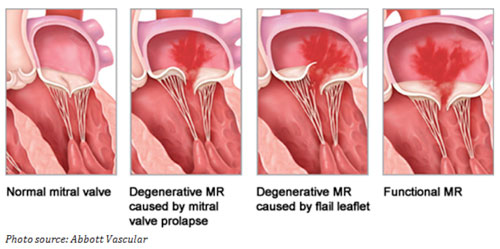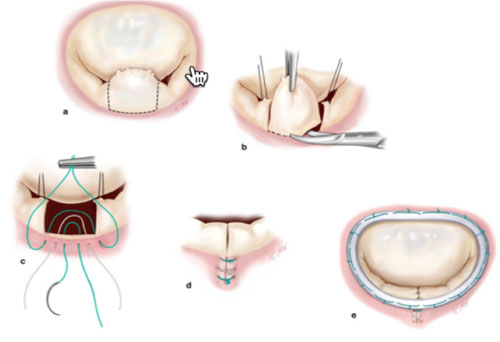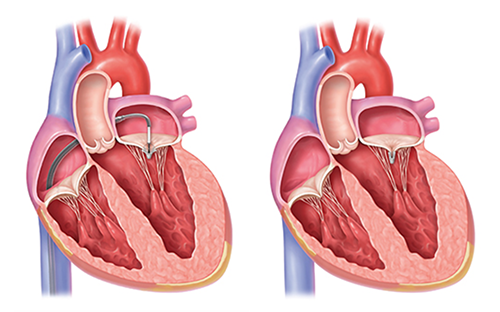Mitral Regurgitation
Mitral regurgitation is a condition where the mitral valve leaflets do not close tightly. When this happens, blood flows backward from the heart's left ventricle into the left atrium, making the heart work harder to push blood through the body. There are two types of mitral regurgitation: degenerative and functional.
Degenerative mitral regurgitation, also called primary mitral regurgitation, is caused by damage to the mitral valve leaflets. Functional mitral regurgitation, also called secondary mitral regurgitation, is caused by enlargement of the heart due to heart attack or heart failure. The ventricle becomes enlarged and doesn’t contract like normal, which causes the leaflets of the valve not to meet in the center.

If left untreated, mitral regurgitation can cause lots of stress on the heart, recurrent episodes of heart failure, severe shortness of breath, swelling of the legs, frequent hospital stays, and ultimately leads to death. Repairing the leak may change the course of the disease and increase a patient’s overall quality of life.
Signs & Symptoms
Many people do not realize that they have mitral regurgitation until they start experiencing symptoms. This can occur gradually over time and may include:
- Fatigue
- Shortness of breath
- Cough
- Heart failure
- A feeling of heaviness on the chest
- Swelling in the legs
- Palpitations
Treatment Options
Mitral valve regurgitation treatment depends on how severe your condition is, if you're experiencing signs and symptoms, and if your condition is getting worse. The goal of treatment is to improve your heart's function while minimizing your signs and symptoms and avoiding future complications.
Medications
Medications can decrease symptoms and reduce secondary or functional mitral regurgitation, but no medications can treat primary or degenerative regurgitation.
Surgery
Surgical repair or replacement of the mitral valve is recommended for patients who are diagnosed with moderate-to-severe or severe mitral regurgitation. Mitral valve repair or replacement usually involves open-heart surgery while on cardiopulmonary bypass. Mitral valve surgery is usually performed through a cut (incision) in the chest. In many cases, we conduct minimally invasive heart surgery, which involves the use of smaller incisions than those used in open-heart surgery.We recommend mitral valve repair, as it preserves your own valve and may preserve heart function
Mitral Valve Repair
Surgeons can repair the valve by reconnecting valve flaps (leaflets), replacing the cords that support the valve, or removing excess valve tissue so that the leaflets can close tightly. Surgeons may often tighten or reinforce the ring around a valve (annulus) by implanting an artificial ring (annuloplasty band).

Mitral Valve Replacement
If your mitral valve can't be repaired, you may need mitral valve replacement. In mitral valve replacement, your surgeon removes the damaged valve and replaces it with a mechanical valve or a valve made from cow, pig or human heart tissue (biological tissue valve).
MITRACLIP® Transcatheter Mitral Valve Repair
Severe, mitral regurgitation is often treated with open-heart valve surgery. However for high-risk patients, open-heart surgery may not be the best treatment option. For these patients, MitraClip is the only approved minimally invasive, non-surgical treatment option. MitraClip is performed through a vessel in the groin using a catheter. LEARN MORE | MITRACLIP® Transcatheter Mitral Valve Repair

Who to contact
If you have been diagnosed as having mitral regurgitation, you should consult with a cardiologist, who can advise you of your options. Fortunately, there are more options for patients with this disease than ever before.
Broward Heart Valve Center
1625 SE 3rd Ave | Suite 300
Fort Lauderdale, FL 33316
Phone: 954-761-2328
Fax: 954-355-4881


